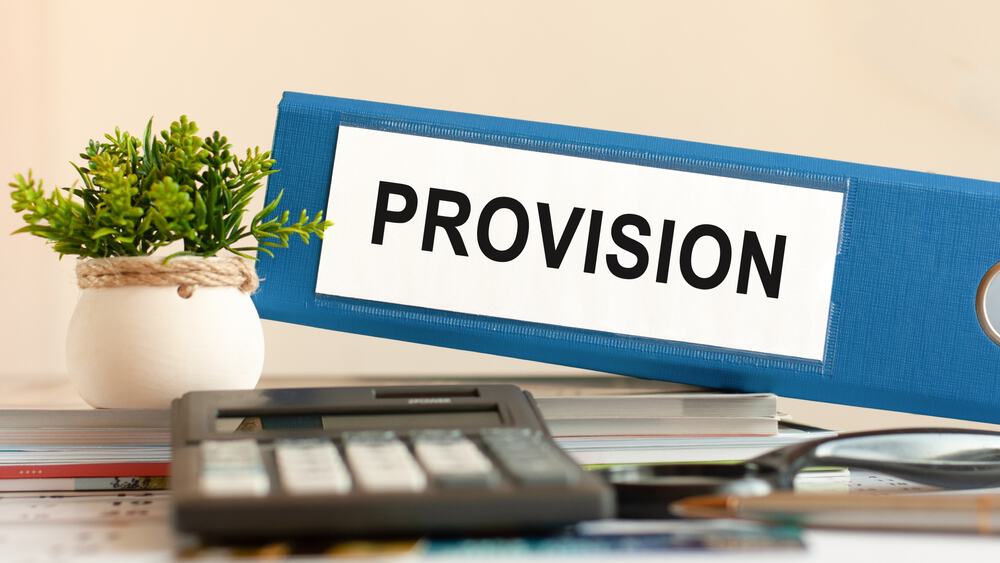Discover how your company’s UK taxes may be affected by provisions and how you can determine your future earnings through correct reporting.
Provisions in Accounting
Companies face various expenses throughout the accounting year; running a business takes money. Whether it’s business expenses or tax deductions, there will always be something.

To help businesses budget for obligations (liabilities), provisions are put aside. Provisions in accounting are basically funds put aside from profits to help cover expenses.
However, companies can’t simply spend money and call it provisions. To qualify as provisions in accounting the money must be intended for a specific purpose. For example, to make up for a decrease in an asset’s value.
You might be thinking “Isn’t that just savings?”
No, provisions are specifically to cover liabilities. This can be for likely obligations too, where a company assumes that the money will be needed at some point. Savings on the other hand can cover unexpected expenses.
Provisions are very important in accounting because the matching principle dictates that revenues and expenses should ideally be reported in the same financial period. If not, costs from a specific year could paint a misleading picture if reported for a different period.
Provisions in accounting essentially help adjust the balance by making sure all expenses are reported in the correct period. This is done by recording provisions on a company’s income statement and balance sheet.
Are Provisions the Same as Reserves?
So, we know provisions are not the same thing as savings, but what about reserves?
Reserve funds are set aside for a specific purpose to improve a business through expansion. This ultimately, makes reserves part of the profit.
Provisions, on the other hand, are allocated for various future expenses. These can be known or assumptions at the time of allocation.
Reserve funds are also much more liquid, making them easier to access for expenses. For example, if a business needs to set aside funds for repairs on work vehicles, reserves are set aside for this.
Provisional accounting is similar in that the purpose for funds is specific, but the amounts and timings are not as flexible. So, the maintenance funds would be more precise and allocated to a specific period (e.g. final quarter).
Types of Provisions
There are many different types of provisions in accounting. One of the most common reasons for provisions is bad debt. Companies can look at their previous bad debts and provisionally set aside the funds needed for the period.
Let’s take a look at the other provision types:
- Restructuring liabilities
- Asset impairments
- Inventory obsolescence
- Guarantees
- Losses
- Pensions
- Product warranties or guarantees
- Deferred tax payments
- Depreciation costs
- Severance payments
- Sales allowances
Requirements for Creating Provisions
While there are many reasons for provisions in accounting, they won’t all qualify. There are specific requirements for funds to be considered provisions:
- Payment is probable
- The amount can be estimated reliably.
- A present obligation (constructive or legal) has arisen because of a past event.
Tax Provisions
You might have also heard of a tax provision. These are funds set aside to pay a business’s income taxes. This is calculated by changing the gross income by the claimed tax deduction.
Once a company has done the tax calculations, the tax provision can be recorded in the accounting books. These funds are then allocated when it’s time to pay taxes.
Are provisions taxable?
HMRC has very specific guidelines for what provisions fall under income tax. If done correctly, following the guidelines, the provision can be tax deductible in the UK.
Is Provision the Same as Accrual?
Accrued expenses have already been incurred but are waiting to be paid. Provisions are allocated towards things that are probable but haven’t happened yet.
Our Final Thoughts
Provisions are quite complex, no matter the size of a business. Specific rules and regulations surrounding what constitutes provisions. There are also Generally Accepted Accounting Practices (GAAP) and international financial reporting standards that dictate how businesses can accurately determine tax provisions.
But have no fear. Hiring an accountant can make figuring out company accounting provisions simple. They have the knowledge and experience to categorise company liabilities correctly, ensuring the balance sheet is up to date.
Sources:
https://www.netsuite.com/portal/resource/articles/accounting/provisions-accounting.shtml
https://gocardless.com/guides/posts/what-are-provisions-in-accounting/
https://www.freshbooks.com/hub/accounting/provisions-accounting
https://www.gov.uk/hmrc-internal-manuals/business-income-manual/bim46510